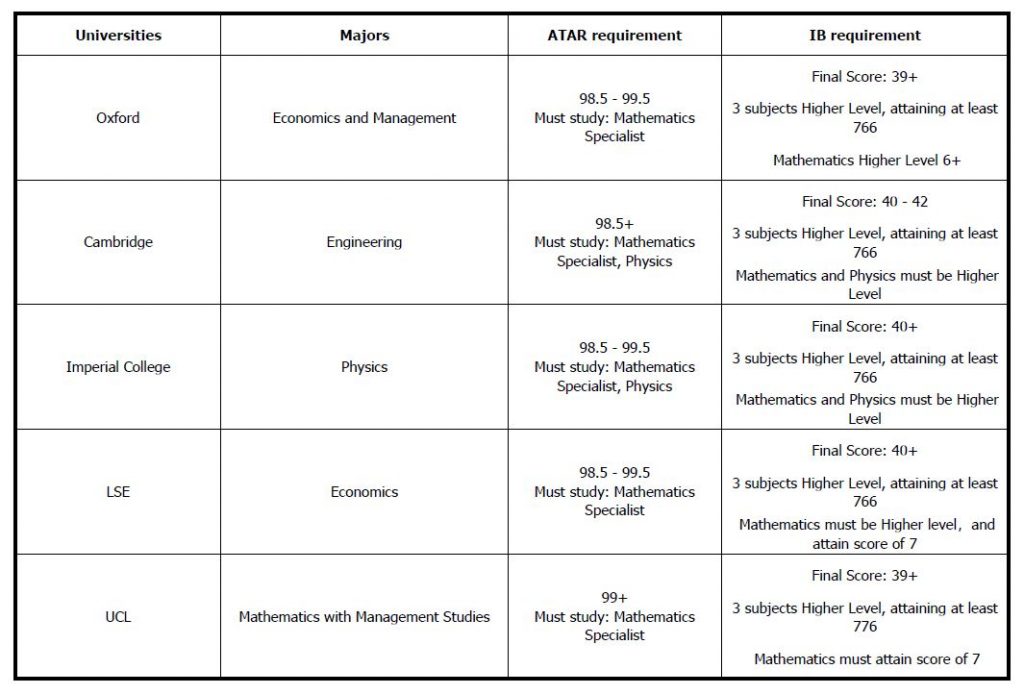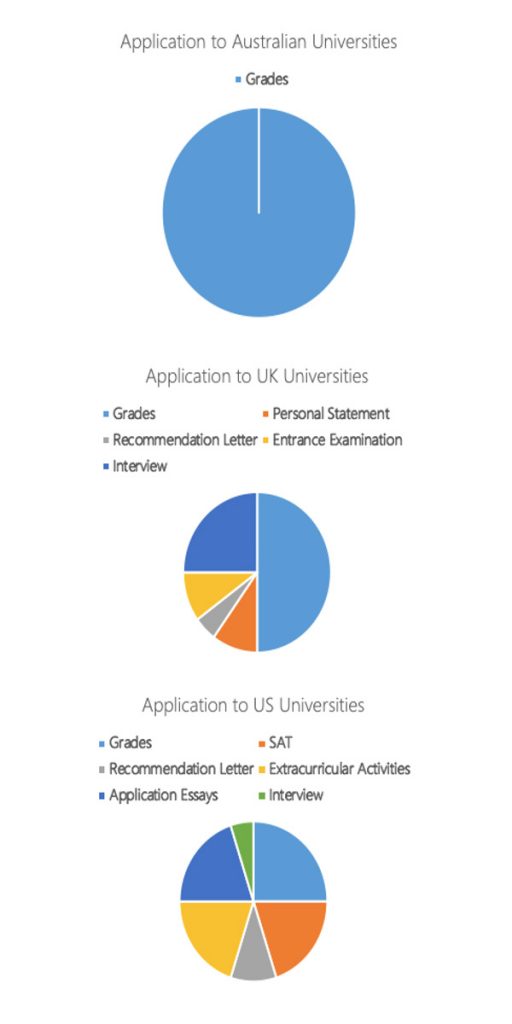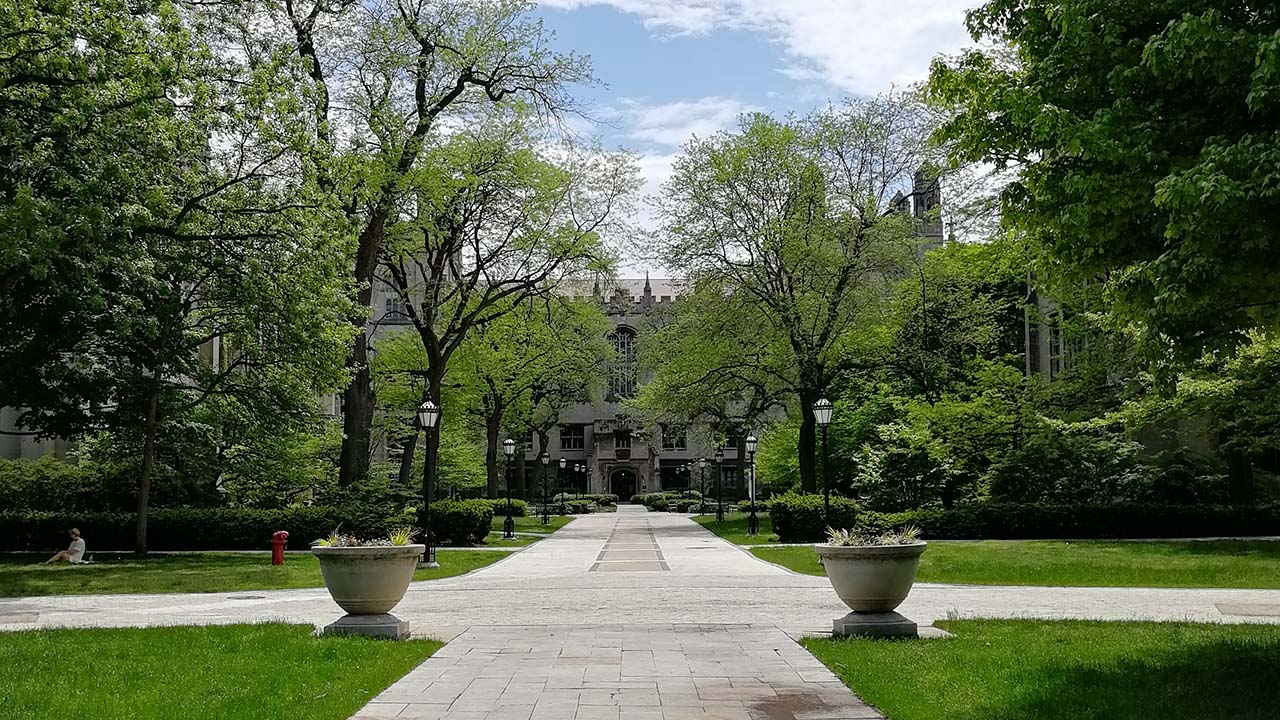Given Australia’s growing university tuition fees and lacklustre undergraduate-level teaching, more and more Australian high school students are beginning to consider whether they should stay in Australia for their university education. It is with no doubt that prestigious universities such as Harvard, Yale, Oxford, and Cambridge are extremely attractive to all students. However, many parents and students often talk about all the additional work required in order to apply to these famous institutions. What does this extra work really consist of? Today, I will discuss what Australian high school students need to do to apply for these top universities. If you are interested in studying in Hong Kong, Singapore or other countries, you may find information you need in this article as well.
Australian University Application – Academic Achievement Is the Standard of Assessment
As we all know, the application to an Australian University is straightforward. Whether you are studying VCE/HSC or IB, your final Year 12 exam and results are converted into an ATAR. This then determines the universities and majors/courses you can be admitted to. The entire application process can be completed with simple guidance from your school teacher. Therefore, if you are applying to an Australian university, your priority is to study to achieve the highest possible VCE/HSC/IB scores you can in order to be accepted into better schools and more competitive courses.
UK university application – Academic Interest + Academic potential are the most important
If you want to apply for a UK university, achieving good grades is still your most important task , and your final ATAR score is still a very important indicator. However, it is worth noting that in addition to your final ATAR, UK university admissions may have detailed requirements for the specific scores in each subject. For example, students who want to study engineering must study specialist mathematics and physics in high school. Those studying the IB curriculum also have clear score requirements.
Here are some example: requirements:
It can be seen that there are similar entry requirements for many of the top UK universities and their respective majors. Australian students must pay attention to these three key issues in Year 11:
- Be clear about the field of study you want to apply for in the future. You don’t need to lock one in, but you need to know the basic direction.
- According to your field of study, for each university and each major, select the correct high school subjects to meet the corresponding entry requirements.
- Meet the university’s requirements for your ATAR, and the respective score requirements for each subject.
So, if you meet the above requirements, does that mean you can be admitted into a UK university?
Not necessarily. In addition to the hard indicators such as your ATAR, there are a number of other requirements for entry into UK universities. If the score can tell a student’s learning ability, UK universities also values a student’s academic interest and academic potential in the field. They want to know if you understand and love the profession you are applying for. Furthermore, they want to know whether you can keep up with the academic learning and contribute to class discussion and research.
To supplement your academic interests, the following materials are required when applying to a UK university.
- Personal Statement: An essay that introduces your own learning experiences and learning objectives. In this essay, the school hopes to see your passion for the major you are planning to study, the origin of this passion, and the positive impact this passion has hard on your previous studies. If you can convince the school that you are fully motivated and have made all the necessary preparations for studying the profession you are applying for, then the personal statement is can basically complete
- Letter of recommendation: A letter from your school teacher that acknowledges your academic ability, conduct and interest with reference to your academic grades
- Entrance examination: For many competitive fields of study, UK Universities will set up an entrance examination in order to screen students. For example: the TSA (Thinking Skills Assessment) used by the University of Oxford’s Economics and Management profession and the Engineering Admissions Assessment used by the University of Cambridge. It must be noted that these entrance exams do not test the expertise of the subject you are applying for, but rather measures your ability in critical thinking and problem solving, skills which are essential for success in higher education.
- Interview: The interview appears after the primary screening. Almost all majors at Cambridge and Oxford require an interview, while other colleges and universities (such as Imperial College’s physics major) also require an interview. The interview is arguably most rigorous and direct assessor of the applicant’s academic level and academic interest. It requiring long-term preparation as well as insights into the field of study you are interested in pursuing.
Finally, there is a question that many students pay attention to: IELTS. Can Australian high school students apply for a UK university without an IELTS test?
The simple answer is that schools will make their own judgements. Some schools eliminate the need for IELTS requirements (Oxford University, UCL) if you have studied in Australia for more than 2 years. Other schools will see your grades and interviews to determine whether to give you a conditional offer with IELTS requirements. The bottom line is, you are definitely not required to submit IELTS when applying for a prestigious UK school, so just apply!
US College Application – Academic Achievement + Academic Ability + More Holistic Review
Compared to applying to universities’ in Australia and the UK, applications to American universities are much more complicated. This is because your academic achievement and academic ability, including your academic interests, only serves as a part of your US application assessment. In addition to this, the US elite schools also need to examine many other aspects. For example: your maturity, your understanding of the world, your ability to use the resources you have, to create positive influence to yourself and others, to name a few. Given this complexity, how do you look at so many aspects of the applicant? What materials are needed? This is outlined below:
- High school report for all 4 years: American elite schools are very concerned about your long-term performance, so they not only need to see the final score, but also pay attention to all your achievements throughout high school. Through this, they can comprehensively judge your academic ability from your choice from the subjects and the difficulty of these subjects.
- SAT: A third-party competency test which examines your ‘readiness’ for college compared to the rest of the applicant pool. Prestigious American schools believe that different schools, different regions, and different countries have different learning systems and examination systems. As a result, in addition to all your grade reports and final results (ATAR), you are also required to take the SAT.
- Letter of recommendation: Although famous universities in the UK also require letters of recommendation, most universities in the US require at least 2 different types of letters of recommendation. One from the head teacher, in Australia this is generally a careers counsellor or head of house. This letter is used to understand your overall performance, personality and conduct. The other is from a teacher of your choice. This is to further understand your specific learning situation and attitude.
- Activity List / Resume: US prestigious schools require you to provide information about all the important activities you have participated in the four years of high school. This is used to judge your enthusiasm and ability to make changes.
- Application documents: Unlike the personal statement in the UK, which emphasize academic interests, elite American schools require many different types of application documents. Some require you to write an essay talking your own story, to understand your what you have been through and what makes you who you are. Others require you to talk your academic and professional plans, and some even require you to express your views on social issues.
- Interview: Unlike Cambridge and Oxford, where professors interviews the applicants, the vast majority of American universities have alumni interviewing the applicants. The interview is not focused on your academic aspect, but rather a chat that can be related to anything. The School Admissions Committee will consider the report written by the interviewer and other materials of the applicant.
Finally, it is worth mentioning that the most significant difference between admission into US universities and admission to Australian and UK universities is that American universities, especially top universities, have very low academic requirements for students at the time of enrolment , and can even allow students to leave their major undecided. That is, “it is not clear what you want to learn now, lets talk about it later.” This is directly related to the setting of undergraduate education in the United States. Almost all top universities (top 30) advocate general education or a liberal arts education, that is, in the first two years of college, students do not need to be limited to a specific field of study. On the contrary, the school requires students to choose elective courses in various fields, such as mathematics, foreign languages, literature, computer science. In the third year of the university, students can choose the majors they are interested in based on their previous multi-faceted elective courses. This is very different from the university education in Australia and the UK, and is more suitable for those students who cannot determine their academic interests immediately after high school.
Up to here, everyone should have already felt the complexity of the application of a famous American university. Here is a simple summary of what we said:
Note: The proportion of different assessment involved with British and American universities in the above picture is only used for indication.













